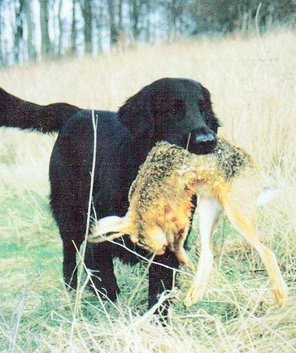1. What is your relationship with the breed? When did you get your first Flatcoat?
My first experience was in 1974 my boss had a flatcoat. Then when I was on holiday visiting my family back home my neighbour allowed my in season border collie he was looking after run with the boss's flatcoat called Squash I didn't know about this until I got home and had 5 collie x flatcoat puppies! I next met flatcoats in 1981 when staying with the Morsheads in Devon. They introduced me to Brenda Phillips and through Brenda I got my first Flatcoat. She was by Exclyst Imperial Mint our of Rosey of Exclyst whose sire was Warresmere Rum Punch.
I was looking for a working gundog at the time and our pup Peggy turned out to be a great working dog. I have always kept my flatcoats for working primarily with one exception, when I got divorced I did for a few years show them as my children were too small to take round the shoots I showed my flatcoats and started judging in the show ring. I used to run a working group with my ex-husband and still do help new owners to train their dogs, often finding them a place on a shoot as well. I believe it is important that new owners are encouraged to try working their dogs.
2. What do you like the most in a working Flatcoated Retriever?
The joy of seeing them work, as they love using their inate ability to find game other breeds have missed. They enjoy being out in the field more than anything else.
3. What abilities do you look for when you are breeding a working Flatcoated Retriever

I look for healthy dogs which have longevity in their lines where ever possible. My current young bitches sire was a couple of weeks short of his 14 year birthday when he passed away and her mothers sire lived to 14 as well, her mother is now 7 years old. I look for working ability, visiting dogs I am interested in before using them where ever possible to see how they work. I plan breeding a long time in advance. Good temperament is important as is good sound construction to keep the dog going for many shooting seasons.
4. What could be done to promote the Flatcoat as a field trial/working test dog?
Being very encouraging to new owners to take up the sport, I do hear from novices that they have been put off by some trainers who they feel are 'assuming they are not worthy and are only playing at training' or the trainer is too hard on the dog, thankfully not so often among FCR people.
5. How does a working Flatcoat excel as a picking up dog?
They have an inate gift for finding game and are bold, confident dogs.
6. What’s important to emphasize when training a Flatcoated Retriever?
Not pushing them too fast in training, make sure the basic obedience is there first then allowing them to develop at their own pace into a fantastic working dog.